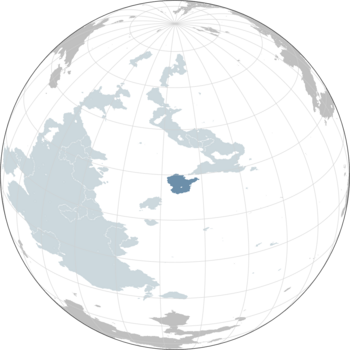Salmuria
Great Nation of Salmuria, Abode of the Heavenly Peace | |
|---|---|
| Motto: 𐤠𐤮𐤮𐤰𐤦𐤧𐤠𐤣 𐤱𐤭𐤠𐤪𐤰𐤠𐤳 𐤱𐤠𐤨𐤠𐤯𐤥𐤵𐤪𐤦𐤥𐤥 Piety brings us forward | |
| Anthem: Assend Qamqelind 𐤠𐤮𐤮𐤤𐤫𐤣 𐤲𐤠𐤪𐤲𐤤𐤩𐤦𐤫𐤣 | |
 | |
| Status | Theocratic temple state |
| Capital | Idulula, Enkoth, and Salmus |
| Largest | Idulula |
| Official languages | Salmurian language |
| Recognised national languages | Moreuan, Frygan, Caran, Puyuan |
| Recognised regional languages | Lefsan (Only has recognition in the Lefsan Islands Territory |
| Ethnic groups (2020) | Salmurian, Demographics of Salmuria |
| Religion | Qibirad (Official) Religion in Salmuria |
| Demonym(s) | Salmurian |
| Government | Theocracy governed by 3 selected god incarnates |
• Ciwš | Idulula (taken name) (𐤦𐤣𐤰𐤩𐤰𐤩𐤠) |
• Ciwš | Enkoth (taken name) (𐤤𐤫𐤨𐤬𐤣) |
• Ciwš | Salmus (taken name) (𐤮𐤠𐤩𐤪𐤰𐤮) |
| Legislature | Gujan Council, Laleaara, and Vidqelara |
| Population | |
• 2020 census | 90,905,295 |
| GDP (nominal) | estimate |
• Total | 1,533,060 million |
• Per capita | 17,034 (not ranked) |
| Currency | Krojsei (SKI) |
| Time zone | UTC+9 (SST) |
| Date format | dd/mm/yyyy (CE) |
| Driving side | right |
| Internet TLD | .sm |
Salmuria (Salmurian: Sarlêtiš 𐤮𐤠𐤭𐤩𐤣𐤶𐤯𐤦𐤳), officially the Great Nation of Salmuria, Abode of Heavenly Peace (Salmurian: 𐤠𐤫𐤫𐤥𐤶𐤮𐤦 𐤲𐤠𐤪𐤲𐤤𐤩𐤠 𐤮𐤠𐤭𐤩𐤣𐤶𐤯𐤦𐤳, 𐤡𐤦𐤭𐤠 𐤹𐤦𐤥𐤠𐤮-𐤲𐤤𐤩𐤠𐤫𐤰 𐤪𐤦𐤤𐤭𐤠𐤣) is an independent island country in Atusia in the Sea of Kasai and its closest neighbor is Kendal. it is officially a temple state governed by the 3 avatar gods of the Qibirad, however, most of the day to day governance is conducted through a large bureaucratic system with a tricameral parliament. It has roughly 90 million inhabitants. Salmuria also has 3 official capital cities being Enkoth, Salmus, and Idulula each named for their Qibirad incarnate god with Idulula being largest of the 3 and hosting the Lower and Upper houses of the Annilaleaara.
Etymology
Salmuria is an anglicized version of the native name "Sarldêtiš", it is unknown exactly where the name Sarldêtiš comes from but it is most likely believed to come from either the original name of one of the 3 capital cities or from an old Naciwas kingdom in mainland Atusia.
History
Pre Naciwas History
Before the arrival of the Naciwans the island of modern Salmuria was inhabited primarily by Moreuans in the North and East, and Malays in the South who have established multiple small trading clans and kingdoms.
Arrival of the Naciwas
It is unclear exactly when the Naciwas migrations started but it is most likely it began during the decline and collapse of Naciwan kingdoms on mainland Atusia in the northern Sea of Kasai region. The migrations and conquest of Salmuria began with bands of Naciwan Mercenaries being invited by certain Moreuan or Malayic clans to later settle in the fertile Western coasts. Soon the income of Naciwans would increase exponentially with entire family clans migrating over, and colonies of Naciwan cities back in northern Atusia being established. The Naciwans would overtime greatly outnumber the native populations on the island and Naciwan religion would dominate gradually evolving into modern Qibirad.
Establishment of the Qibirad
TBA
Demographics
Religion
Qibirad is the official state religion of Salmuria with the vast majority of Salmuria (90-95%) adhering. Other religions are largely practiced by ethnic minorities and foreigners residing in port cities where they are permitted to construct their own religious temples, the most famous example of this is in the port city and capital Salmus.
The largest region in Salmuria not inhabited by majority Qibirad adherents are the Lefsan Islands.
Language
Most of the population speaks Salmurian, the country's official and national language. Others include speakers of other Naciwan languages, within the greater Parthenian-Trianian family, and languages belonging to other ethnicities.
Education
Education in Salmuria is partially centralized. K-12 is compulsory and supervised by the Education Bureau as part of the Board of Rites and Procedure, who largely set nation-wide standard which individual gujds are expected to maintain. Higher education is supervised by the Examinations Bureau within the same board, which largely is responsible for the creation of standardized testing and Kappwud exam. Literacy among people aged 15 and older was 96% in 2020.
The requirement to enter into higher education is to have a high school diploma and pass the Salmurian University Entrance Exam. Salmuria's higher education is sanctioned by different levels of diplomas, including an Associate degree in two years, a bachelor's degree in four years, and a master's degree in two years, after which another exam allows the candidate to peruse a doctoral program.
Health
TBA
Geography
TBD
Climate
TBD
Government and Politics
Legislature
Gujan Councils , Laleaara, and Vidqelara TBD
Government
TBD
Military
Salmuria's armed forces are both a model of a professional modern force and at the same time a relic of Salmuria's ancient and traditional form of governance. Salmuria's Armed Forces consist of the Green Standard Army, the The Four Banners, the Qibirad Millitant Orders, and the Salmurian Navy. There is no separate air force branch as the four banners and the green standard army each maintain their own planes as does the Salmurian navy.
Land Forces
TBD
Aerial Forces
TBD
TBD
Special Forces
TBD
Infrastructure
Transportation
TBD
Energy
TBD
Culture
TBA
Food
TBA
Economy
TBA


